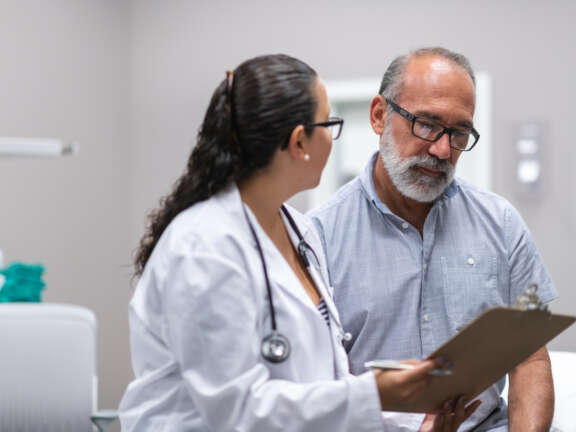Your Primary Care Provider is Key to Cancer Prevention


Each year, nearly 2 million people in the US are diagnosed with cancer, and more than 600,000 of them will lose their lives to the disease. In Texas, about 140,400 new cancer cases are diagnosed yearly. Breast, prostate, lung, and colorectal cancers top the list.
Regular preventive cancer screenings save lives. Mammograms alone save about 12,000 lives each year in the US. Timely colorectal screenings could prevent 33,000 deaths every year. And thanks to screenings, the cervical cancer death rate has dropped by more than 50% over the past 30 years.
Preventive cancer screenings are just one of the many reasons we strongly encourage you to visit your primary care provider (PCP) every year. In addition to going over your personal risk factors, your PCP can help you stay up to date with the cancer screenings you may need.
Stay on Track with Your Health
It is important to catch cancer in its earliest, most treatable stages. Here’s how to stay on track with screenings:
- Schedule regular check-ups. If it has been a year or more since your last physical, make that appointment today—even if you’re feeling fine.
- Be proactive. If you have a family history of cancer or any other risk factors, let your PCP know. It is also important to let your provider know if there are any changes in your health. Don’t put it off.
- Follow through. Get your tests when they are ordered. Early detection is critical.
Top Cancer Screenings Your PCP May Recommend
Here are the cancer screenings your primary care provider may recommend based on your age, gender, family history, and overall health:
- Breast Cancer: Breast cancer is the most common cancer among women in Texas, accounting for nearly 31% of all new invasive cancer diagnoses. The good news is that because of better tests and treatments, fewer people are dying from breast cancer. The chance of dying from it is now only 2.5%. Mammography helps save lives by detecting cancer early, when it is most treatable. The US Preventive Services Task Force recommends screenings beginning at age 40, and every two years until age 74. Your provider may suggest earlier or more frequent screenings if you are at higher-than-average risk. Innovista Medical Center makes mammogram scheduling as easy as possible. We partner with organizations like The Rose, which sends mobile mammography busses to our clinics for patients to get screened.
- Cervical Cancer: Texas has one of the highest rates of cervical cancer in the US—1,490 new cases are diagnosed each year. Pap smears and HPV tests can help spot abnormal changes that may lead to cervical cancer. In fact, with regular screenings and early detection, the five-year survival rate is 95%. The American College of Obstetricians and Gynecologists recommends cervical cancer screenings beginning at age 21. Many of our Innovista Medical Center providers are able to perform Pap smears, which can be performed during your yearly physical.
- Colorectal Cancer: Colorectal cancer ranks as one of the top three most diagnosed cancers in both Texas and the US. It is also one of the most preventable. The latest guidelines say screenings should start at age 45 for people at average risk. Colonoscopies are the best screening tool. They allow doctors to find and remove polyps before they become cancerous. However, you may also have the option of using a test called Cologuard. Done in the comfort of your own home, you collect your stool in a special package provided to you, which you then send to a lab for analysis. Your Innovista Medical Center provider can order Cologuard for you without the need for referrals or any other appointments.
- Skin Cancer: One out of every five people in the US will get some type of skin cancer in their lifetime. In Texas, the risk is higher—one out of three—because of stronger sunlight and more sunny days. Skin cancer can be prevented and is easy to treat if found early. Scheduling regular skin checks with your primary care provider or dermatologist can spot any changes that could indicate skin cancer.
- Prostate Cancer: Prostate cancer is the most common cancer in men in Texas, but most men live at least five years after being diagnosed. The best way to find it early is with a prostate-specific antigen (PSA) test. This blood test checks for a protein made by the prostate. Men usually start PSA tests between ages 55 and 69, or earlier if they have a higher risk. Your PCP can help decide when you should get tested and can order it along with your other blood tests.
- Lung Cancer: Not many people are screened for lung cancer, but if you have ever smoked, you should get checked. Experts recommend a yearly low-dose CT scan for adults ages 50 to 80 who have smoked a lot (20 or more packs a day), have quit in the last 15 years, or still smoke. Your PCP can help decide if you need this test based on your health history.
Your Primary Care Provider Is Your Wellness Partner
Your primary care provider is more than just someone you see when you're sick. They’re your partner in health and your first line of defense against cancer.
At Innovista Medical Center, we’re here to help guide you through your wellness journey, providing personalized care and ensuring you’re on track with the screenings that matter most for your health. Call us at 866-325-0301 or schedule your appointment online.
